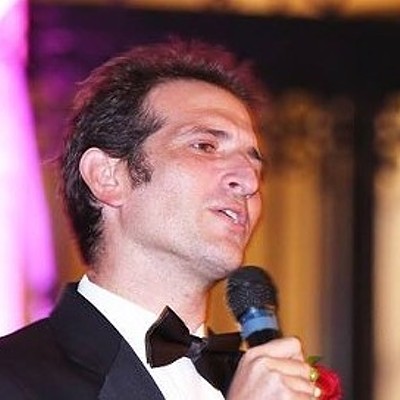A century ago, before the advent of sound in film, theater owners would hire a pianist to play while images were projected silently on the screen. When the Miami Jewish Film Festival (MJFF) organizers had the opportunity to screen three recently restored silent films, they resolved to bring the live-scoring format into the 21st Century.
"We thought a contemporary sound would create a unique fit for these movies," explains the festival's executive director Igor Shteyrenberg.
Each night a different local musician will live-score a different silent film. On January 17, Richard Vergez scores Broken Barriers, followed by Rostislav Vaynshtok with Jewish Luck on January 18 and Sander Willig adding sound to Hungry Hearts on January 19.
"These films were recently discovered and restored by the National Center for Jewish Film," Shteyrenberg tells New Times. "During World War II, so many of these prized treasures were destroyed. Somehow these films were able to survive in obscure locations. They show how Jewish life once was."
Shteyrenberg says he has given the musicians enormous leeway — so much so that he'll hear the scores for the first time on the night of the screenings, along with everyone else in the audience.
"Sander Willig of the Miami Music Project will be playing with a bandmate," Shteyrenberg notes. "What he is doing with Hungry Hearts is very personal for him. The film reminded him of the stories he heard of his family immigrating from Eastern Europe to the United States."
The January 17 artist, Vergez, founder of Noir Age Publishing, says his aim was "to create a sonic mood and let the film's visuals tell the story. The instrumentation will consist of a synthesizer, clarinet, bowed saw, and hammered dulcimer. It's a mixture of ambient and minimal music with touches of the Klezmer scale. And since the film is a drama, you can expect some pensive and existential soundscapes."
Vergez says his score's foundation is rooted in research.
"I was able to acquire some original vinyl releases of early Yiddish music — namely the cantor Mordechai Hershman, who was performing music around the time that Broken Barriers was released in the 1920s," he explains. "I felt the need to immerse in the sounds of this era to help inform the score, then deconstruct in the way that I do."
Vaynshtok (AKA Slavvy) has a long history of live-scoring for MJFF.
"In 2018, I did it for the animated film Fantastic Planet at Coral Gables Art Cinema. They oversold the event and had to pull out all these extra folding chairs," Vaynshtok recounts. "I did a bare-bones piano accompaniment but I loved it. It's become a tradition for me to do one of these every year for the Miami Jewish Film Festival."
Vayhshtok loves the freedom scoring a silent film allows.
"I can go nuts," he says. "I don't have to worry about having to stop playing every time there's dialogue."
He adds that his creative process was heavily influenced by a documentary about the making of the video game Max Payne 3.
"I pick a scene in the movie to give me a mood. Once I have a base, I almost don't have to watch the rest of the movie any more," Vayhshtok explains. "I compose two or three minutes for that scene, but I make it so everything can be interchangeable. I'll usually watch the movie out of order in bits and pieces, and I'll start dropping in pieces of music that go with the story."
Recently Vayhshtok created his own short film, What Can Be Broken, Should Be Broken, which informed his scoring process for Jewish Luck.
"When I did Fantastic Planet, I didn't have any filmmaking experience," he says. "Now that I've made a movie, it has influenced my scoring in a way. I think more as I'm making the music about what they are doing in a scene, why did they shoot it that way?"
For his January 18 performance at the rooftop of the Betsy Hotel, Vayhshtok will employ an '80s-style synthesizer, the Roland D-50.
"I haven't done a live-scoring on a rooftop yet. I did it in movie theaters that were enclosed, so we knew how it would sound," Vayhshtok says. "In the open air, you lose some control of the sound, but I'll patch into the system and see how it goes. I'll bring a little mixer and an intelligent sequencer that I can run the synth through, so I don't have to worry about playing the whole thing live as I did the previous movies."
Miami Jewish Film Festival's "Yiddish & Jewish Cinema Between Two Worlds." 7 p.m. Monday, January 17, through Wednesday, January 19, at the Betsy Hotel, 1433 Collins Ave., Miami Beach; miamijewishfilmfestival.org. Admission is free with RSVP at mjff.eventive.org.
[
{
"name": "GPT - Billboard - Slot Inline - Content - Labeled - No Desktop",
"component": "16971022",
"insertPoint": "2",
"requiredCountToDisplay": "2"
},{
"name": "Editor Picks",
"component": "15769925",
"insertPoint": "4",
"requiredCountToDisplay": "1"
},{
"name": "Inline Links",
"component": "16575154",
"insertPoint": "8th",
"startingPoint": 8,
"requiredCountToDisplay": "7",
"maxInsertions": 25
},{
"name": "GPT - Rectangle 2x - Slot Auto-select - Labeled",
"component": "15782206",
"insertPoint": "8th",
"startingPoint": 8,
"requiredCountToDisplay": "7",
"maxInsertions": 25
},{
"name": "Inline Links",
"component": "16575154",
"insertPoint": "8th",
"startingPoint": 12,
"requiredCountToDisplay": "11",
"maxInsertions": 25
},{
"name": "GPT - Leaderboard to Tower - Slot Auto-select - Labeled",
"component": "15782207",
"insertPoint": "8th",
"startingPoint": 12,
"requiredCountToDisplay": "11",
"maxInsertions": 25
}
]












